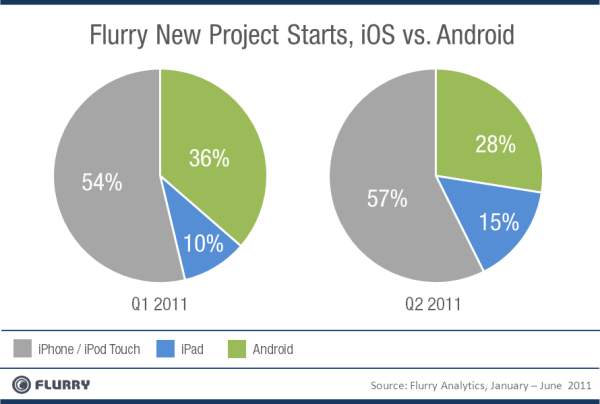| Android losing developers to iOS |
| Written by Janet Swift | |||
| Saturday, 16 July 2011 | |||
|
Flurry has detected a recent shift in mobile development with fewer Android and more iOS project starts in the past three months and suggests some reasons for this change. Recent figures from the Flurry Analytics service, in which the company assesses Android and iOS project starts, show that Android popularity has declined.
The total Flurry iOS and Android new project starts grew from 9,100 in the first quarter of 2011 to 10,200 in the second quarter. However while new project starts for iPhone and iPod grew from 54 percent in the first quarter of this year to 57 percent in the subsequent quarter, and iPad jumped from 10 percent to 15 percent, Android declined to 28 percent from 36percent in that time period. This is all the more marked given that Android activity had peaked at 39 percent in the fourth quarter of 2010 after a steady increase in 2010. The Flurry blog points to two events that could have caused developers to be more interested in iOS this shift - the iPhone launch on Verizon and the the iPad 2 launch. It also refers to some problems faced by Android developers - billing fragmentation, OS fragmentation and storefront fragmentation and concludes (with a yachting metaphor): With developers pinched on both sides of the revenue and cost equation, Google must tack aggressively at this stage of the race to ensure that Apple doesn’t continue to take its developer-support wind. More:iPad 2 and Verizon iPhone Take Some Wind Out of Android’s Sail
|
|||
| Last Updated ( Saturday, 16 July 2011 ) |

